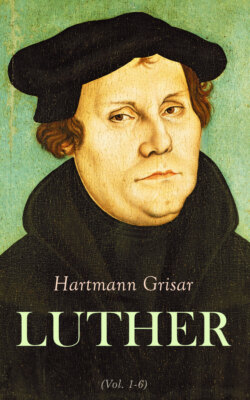Читать книгу LUTHER (Vol. 1-6) - Grisar Hartmann - Страница 81
На сайте Литреса книга снята с продажи.
4. Luther’s Followers. Two Types of His Cultured Partisans: Willibald Pirkheimer and Albert Dürer
ОглавлениеTable of Contents
Owing to the huge and rapid circulation of the three “Reformation works,” the number of Luther’s followers among all classes increased with prodigious speed.
The spirit of the nation was roused by his bold words, the like of which had never before been heard.
Too many of those whose Catholicism was largely a matter of form were seduced by the new spirit that was abroad, and by the “liberty of the Gospel,” before they rightly saw their danger. The fascination of the promised freedom was even increased by Luther’s earnest exhortations to commence a general reformation, to cultivate the inner man, and to assert the independence of the German against immoral Italians, the extortioners of the Curia and the spiritual tyranny of the Pope. Even better minds, men who despised the masses and their vulgar agitation, were powerfully attracted. At no other time, save possibly at the French Revolution, was mankind more profoundly stirred by the force of untried ideas, which with suggestive power suddenly invaded every rank of society. Scholars, writers, artists, countless men who had heard nothing of Luther that was not to his advantage, and who, from lack of theological knowledge, were unable fully to appreciate the spirit of his writings, were carried away by the man who so courageously attacked the crying abuses which they themselves had long bewailed.
In explaining this universal commotion we cannot lay too great stress upon a factor which also played a part in it, viz. the comparative ignorance of most people regarding Luther, his antecedents and his aims. Eminent men, and his own contemporaries, who allowed themselves to be borne away by the current, were incredibly ignorant of Luther as he is now known to history. They knew practically nothing of the whole arsenal of letters, tracts and reports which to-day lie open before us and are being read, compared and annotated by industrious scholars. It is difficult for us at the present day to imagine the condition of ignorance in which even cultured men were, in the sixteenth century, regarding the Lutheran movement, especially at its inception.
To show the seduction and fascination exercised by Luther’s writings even on eminent men, we may take two famous Nurembergers, Willibald Pirkheimer and Albert Dürer.
Willibald Pirkheimer, a Senator of Nuremberg and Imperial Councillor, was one of the most respected and cultured Humanists of his day. He edited or translated many patristic works. After taking a too active part in the Reuchlin controversy against the theologians of Cologne, owing to his zeal for a reformed method of studies, he put himself on Luther’s side, again out of enthusiasm for reform, and under the impression that he had found in his doctrine a more profound conception of religion. He received Luther as his guest when he passed through Nuremberg on his return journey from Augsburg, after his appearance before Cardinal Cajetan. In a letter to Emser he declared that the learned men of Wittenberg had earned undying fame by having been, after so many centuries, the first to open their eyes, and to distinguish between the true and the false, and to banish from Christian theology a bad philosophy.[97] Eck even inserted his name in the Bull of Excommunication which he published, though Pirkheimer was absolved on appealing to Pope Leo X. He wrote, in Luther’s favour, a letter to Hadrian VI which, however, was perhaps never despatched, in which he calls him “a good and learned man.” The entire blame for the quarrel was thrust by this disputatious and peculiar man on Eck and the Dominicans.
In later years, however, he withdrew more and more from the Lutheran standpoint, chiefly, as it would appear, because he perceived the unbridled nature of the Reformers’ views and the bad moral and social effects of the innovations. He died in 1530 at peace with the Catholic Church.
